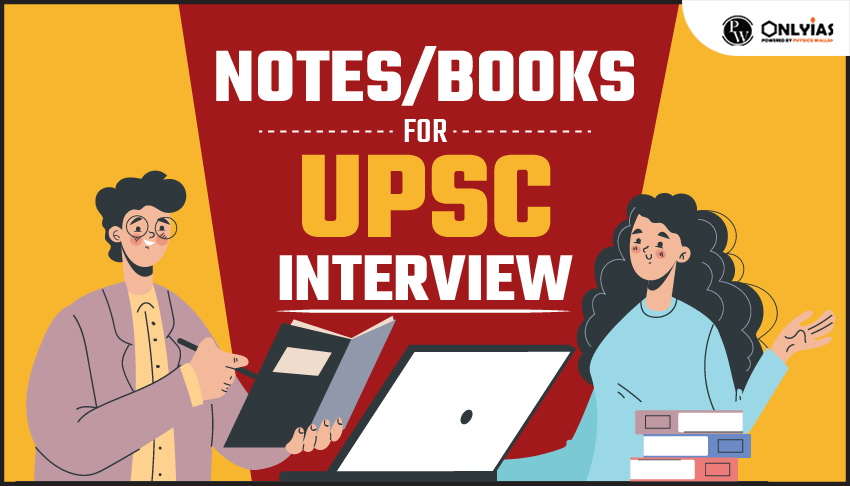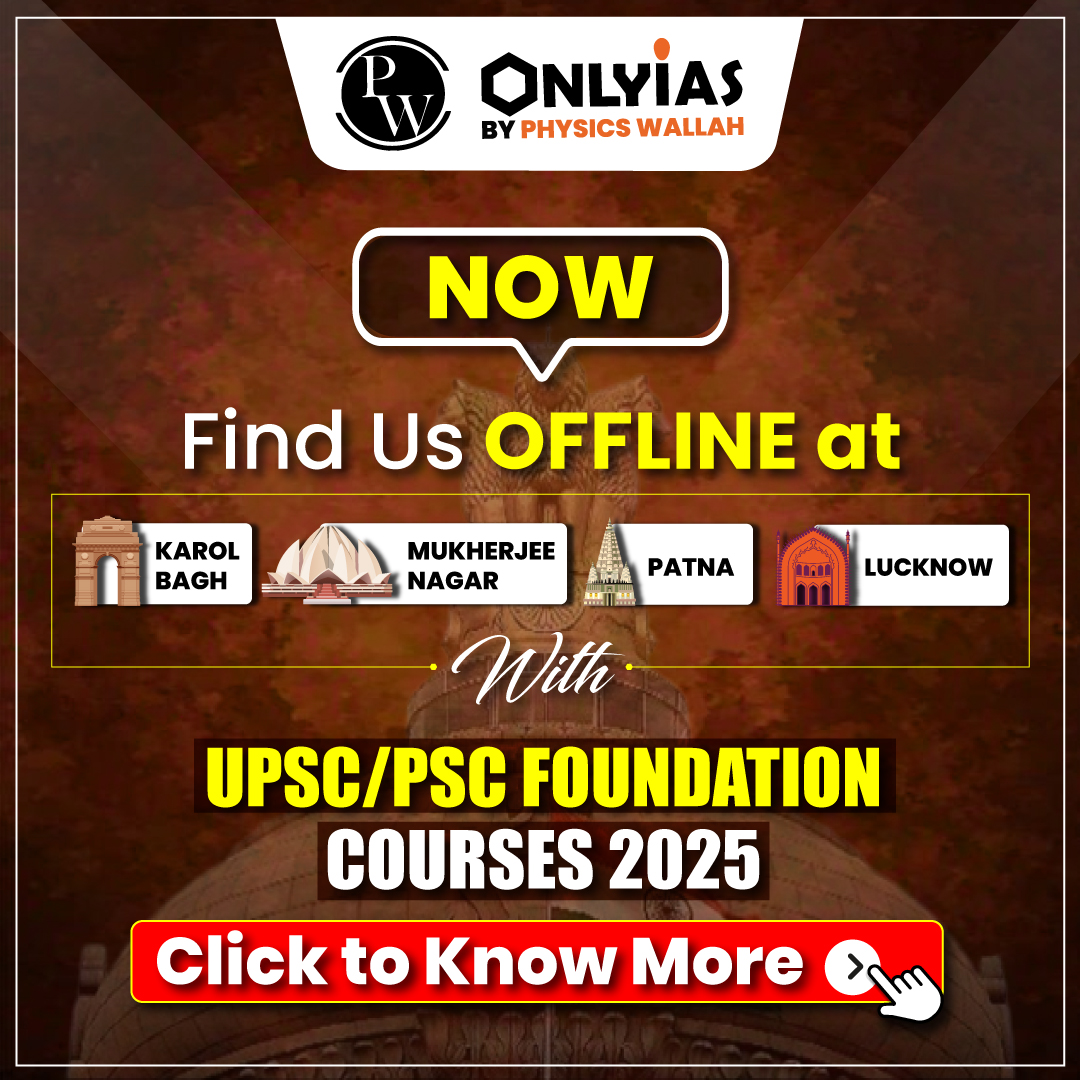Our Courses

If you’re serious about preparing for the UPSC exam, you’ll need these UPSC books list and UPSC notes as your primary study material. This page has provided a list of five important books for the UPSC Interview and briefly explained why they are necessary for the UPSC Interview Preparation.
In today’s world, where time is of the essence, students preparing for UPSC exams have a vast array of study materials to choose from, including YouTube videos and eBooks. However, physical books still hold great value as they contain detailed examples and are perfect for long study sessions.
Moreover, to help students prepare for the IAS prelims and Mains exams and learn from the experience of UPSC toppers, it is essential to have the right IAS prelims books and IAS notes. When preparing for the UPSC CSE Interview, candidates must thoroughly understand complex topics and recall important events and dates.
Furthermore, to aid in making an informed decision, we have compiled a list of recommended books for UPSC prelims, mains, and IAS toppers notes. Our comprehensive overview of each book’s benefits will help you choose the right books for your preparation and ensure you are satisfied with your decision later.
When planning for the UPSC interview, reading books can be extremely beneficial. It not only broadens your perspective but also improves your language skills. Many books in the market are tailored to cater to UPSC preparation needs, such as IAS prelims books, IAS notes, and books for UPSC mains. UPSC toppers notes can also prove to be very helpful.
Moreover, to make it easier for candidates, we have compiled a UPSC book list that provides an extensive overview of each book’s benefits, ensuring you make an informed decision.
You can also check for UPSC Online Application Form 2023.
India’s Struggle for Independence by Bipan Chandra is an essential book for anyone preparing for the UPSC CSE interview. It covers India’s freedom struggle from 1857 to 1947. Thus explaining the significant events and personalities that played important parts in the country’s freedom.
India’s Battle for Freedom is an important resource for those planning for the UPSC examination. It offers a detailed account of India’s set of experiences during the colonial time frame and the occasions that prompted its independence. Moreover, it covers subjects like the INC, the Non-Cooperation Movement, the Civil Disobedience Movement, the 1857 revolt, and the Quit India Movement.
Besides, it briefly examines the splendid personalities of the pioneers who battled enthusiastically for India’s freedom, consequently making it a phenomenal resource for acquiring knowledge about the nation’s battle for freedom.
You can also check for UPSC Admit Card 2023.
Indian Polity by M. Laxmikanth is a comprehensive and informative book highly recommended for UPSC aspirants preparing for the CSE interview. It covers all aspects of the Indian political system, including the Indian Constitution and governance. Here are some reasons why this book is crucial for UPSC interview preparation.
Firstly, laxminkanth book gives an in-depth understanding of the Indian Constitution. Moreover, it covers the Constitution, its features, and the principles on which it is based. This knowledge is essential for aspirants as questions about the Constitution are frequently asked in the UPSC interview.
Secondly, it covers various organs of the Indian government, including the executive, legislature, and judiciary. It also explains the roles and functions of these organs and their relationship. It is crucial as it clearly explains how the Indian government works.
Thirdly, it covers the various level of government in India, i.e., Central, state, and Local govt. Besides, it explains their powers, capabilities, and relationship with one another. This information is fundamental for candidates as it assists them with grasping the complexities of the Indian political framework.
Lastly, it covers different public policies, like education, health, and well-being. Also, it explains the objective of these policies, their execution, and their effect on the residents of India. This information is fundamental for aspirants as questions connected with public policies are often asked in the UPSC interview.
You can also check for UPSC Notifications 2023.
Crack Civil Services in First Attempt by Divey Sethi IRS is a valuable resource for aspirants preparing for the UPSC CSE interview. This book provides a step-by-step guide to cracking the UPSC exam on the first attempt, including tips, strategies, and insights from the author’s personal experience.
The book covers various topics, including the UPSC exam pattern, syllabus, and selection process. It also includes chapters on time management, effective study techniques, and how to prepare for the interview stage. This knowledge is essential for aspirants as it helps them develop a structured and effective approach to their UPSC preparation.
The author, an IRS officer, shares her personal experiences and provides tips on preparing for the interview stage. This knowledge is vital for aspirants as the interview stage is crucial to the UPSC selection process.
The book also provides valuable guidance on managing stress and anxiety during the UPSC preparation process. It includes chapters on mindfulness, meditation, and positive thinking, which can help aspirants stay focused and motivated throughout their UPSC journey.
You can also check for UPSC Prelims Answer Key 2022.
Interviews: The Last Hurdle by Unique Publishers is a highly recommended book for aspirants preparing for the UPSC CSE interview. The book is specifically designed to provide aspirants with an understanding of the interview stage of the UPSC selection process.
The book also provides valuable guidance on effectively communicating and presenting oneself during the interview. It includes chapters on body language, tone, and how to build rapport with the interview panel. This helps aspirants make a positive impression on the interview panel.
Additionally, this book provides aspirants with tips and strategies for handling difficult questions. The book includes chapters on tackling hypothetical questions, questions about current affairs, and questions about the candidate’s background. This knowledge is essential for aspirants as the interview panel often asks challenging and unexpected questions.
You can also check for UPSC Prelims 2022 Question Papers Pdf.
Indian Economy by Ramesh Singh is a must-read book for UPSC aspirants preparing for the interview stage. It gives a comprehensive understanding of the Indian economy, including its history, current state, and future. This knowledge is essential for aspirants as the UPSC often asks questions about the economy in the interview stage.
One of the main benefits of this book is that it covers different subjects connected with the Indian economy. It incorporates macros and microeconomics, banking, money, and taxation parts. The book likewise covers significant subjects like inflation, poverty, and economic reforms. This information is essential for applicants as it assists them with deeply figuring out the Indian economy and its functions.
The book additionally gives significant insights of knowledge into the public authority’s economic policies and their effect on the Indian economy. It remembers sections for the Union budget, the Five-Year Plans, and the New Economics policy. This knowledge is essential for aspirants as the UPSC often asks questions about the government’s economic policies in the interview stage.
Another advantage of reading this book is that it gives aspirants a holistic understanding of the Indian economy. It covers theoretical concepts and practical aspects such as economic indicators, statistics, and case studies. This knowledge is important for aspirants as it helps them apply theoretical concepts to real-world scenarios.
| The following articles given in the table below can be referred to for UPSC IAS exam preparation: | |
| UPSC IAS Interview Courses | IAS INTERVIEW QUESTIONS DOWNLOAD |
| OLD INTERVIEW TRANSCRIPTIONS | UPSC INTERVIEW MARKS |
| INTERVIEW BOARD PROFILE | UPSC INTERVIEW |
Q1: How to write notes for the UPSC interview?
Ans: Writing notes for the UPSC interview requires a systematic approach. Firstly, read the relevant material, whether a book or a current affairs article and underline or highlight the key points. After reading, make concise notes that include only the main ideas and relevant details. These notes should be organised by topic and subtopic, making revising and recalling during the interview easier. It is also essential to keep updating the notes regularly with new information and recent developments.
Q2: Where can I get the best notes for UPSC?
Ans: There are various sources to get notes for UPSC, including coaching institutes like “PW OnlyIAS” and reference books. Coaching institutes often provide comprehensive and well-structured notes on various topics. Online platforms like “PW OnlyIAS offer free study material. Reference books such as NCERT and standard textbooks also provide excellent notes for UPSC.
Q3: Is M Laxmikanth enough for UPSC?
Ans: M Laxmikanth’s book on Indian Polity is essential for UPSC preparation, especially for polity and governance-related topics. However, relying solely on this book is not enough for the UPSC exam, as the syllabus is vast, and multiple sources must be referred to. It is crucial to have a diverse range of study materials, including NCERT books, newspapers, magazines, and standard textbooks.
Q4: Can we read Laxmikant without NCERT?
Ans: While M Laxmikanth’s book on Indian Polity is a comprehensive resource for polity and governance-related topics, it is not advisable to read it without NCERT books. NCERT books provide a foundational understanding of various subjects and serve as a prerequisite for the advanced topics covered in standard textbooks. Therefore, reading NCERT books before referring to M Laxmikanth’s book is highly recommended to build a strong foundation for the UPSC exam preparation.
Our Courses
<div class="new-fform">
</div>
